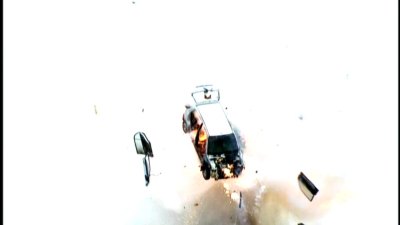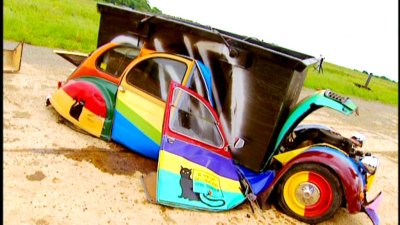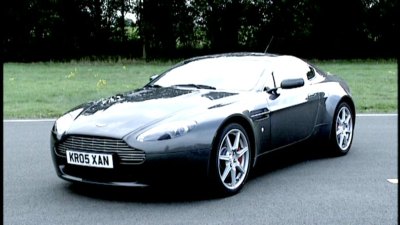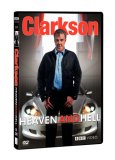| Reviews & Columns |
|
Reviews DVD TV on DVD Blu-ray 4K UHD International DVDs In Theaters Reviews by Studio Video Games Features Collector Series DVDs Easter Egg Database Interviews DVD Talk Radio Feature Articles Columns Anime Talk DVD Savant Horror DVDs The M.O.D. Squad Art House HD Talk Silent DVD
|
DVD Talk Forum |
|
|
| Resources |
|
DVD Price Search Customer Service #'s RCE Info Links |
|
Columns
|
|
|
Clarkson - Heaven & Hell
I know Jeremy Clarkson, the celebrated journalist and host of Britain's highly-rated motor show Top Gear is a total prat who enjoys mouthing off about Americans and Germans and anyone else who isn't English, almost as much as he enjoys bashing expensive cars around the race track. But that's precisely why I like him. Clarkson says what he feels. Sure, some (or all) of it may be calculated for effect; after all, if you've become famous for saying naughty things, you have to keep up appearances. But regardless of the validity (or lack thereof) of what he says (the Americans have never made a decent car - ever?), it's great to hear someone with opinions who (gasp) isn't afraid to proclaim them. In this nervous Nelly, P.C. world we live in, a Jeremy Clarkson makes a lot of people uneasy - and that's just what I like about him. So who cares if he's wrong most of the time?

Actually, when Clarkson sticks to discussing the pros and cons of various automobiles, I can't really say if he's wrong or right. I don't know the first thing about cars, and the breathtaking works of art that he drives in his new DVD, Clarkson: Heaven and Hell, I'll almost certainly never get a chance to drive. We're talking about Ferraris, Astin-Martins, high-end BMWs and Masaratis. Film historians don't drive such cars; they take the bus. They do drive, however, the other end of the car spectrum that Clarkson visits in Clarkson: Heaven and Hell. The dregs of the automobile society: the Fords, the Metros, the Toyota station wagons, and god help me, even a Renault once. Clarkson's goal in this DVD is to find the seven best high performance cars of 2005, while, in Clarkson's words, "torturing and killing to death," seven of the worst (of any year).
It's a pretty cool, fun concept, and for the most part, it comes off quite well. While the central theme of cars that are good enough to go to heaven, or sinful enough in their ineptitude or ugliness to go to hell, is never really properly stated by Clarkson, you start to get the general idea as the feature goes along. And there's quite a bit of anticipation for the coming destruction that Clarkson promises for the cars that don't measure up, and which therefore must not only die, but must be tortured slowly before their demise. Clarkson, in his distinctly snotty, snooty British manner, is hysterically funny deadpaning the miseries he promises to visit on the offending cars. He speaks with such relish when anticipating the drawing and quartering of a Perodua Kelisa he just bought new, and which he has already bashed repeatedly with a sledgehammer - in front of the salesmen who just sold it to him - that it's hard not to be on the edge of your seat waiting for its demise. Unfortunately, there's not nearly enough mayhem for the promised buildup. There are spectacular scenes of destruction, including the aforementioned drawing and quartering of the Perodua, as well as its dismembered carcass being magnificently blown up with dynamite. A most definite statement on the ridiculous circus wagon Citroen 2CV is forcefully made, too (a fully loaded skip is dropped on it, crushing it like a pancake). But other destruction scenes fall flat. The medieval jousting tournament between a Ford Scorpio and a Triumph TR7 only succeeds when he drops the jousting, and just smashes them together head-on. And the conversion-by-saw of a Renault Espace van into a convertible, which Clarkson then drives until it breaks in two, is ruined by the obvious nature of the gag (it's been seen in countless movies, including The Love Bug and A View to a Kill), as well as its clunky execution (you can clearly see the roller bar they installed to allow Clarkson to drive the front half of the split-in-two van).

No, despite my hankering for some serious destruction, Clarkson: Heaven and Hell really succeeds when Clarkson does what he does best: drive and discuss high-performance automobiles. This man truly loves great automobiles. He's articulate and passionate about them much like a connoisseur who's sniffing over a buffet of gourmet delicacies. You can't fake that kind of commitment to your subject; you either have it or you don't. As much fun as it is watching Clarkson actually slam the cars around the track - that's really him, not a stunt driver - it's even better to listen to him almost salivate over the sensual pleasures of driving a truly awesome piece of machinery. That's where the appeal of Clarkson: Heaven and Hell really lies - in Clarkson's total dedication to getting across to the viewer what makes these cars more than just cars. They're works of engineering art, and their purpose isn't mere transportation from here to there. Through their great power, speed, and maneuverability, these cars become one with the driver. According to Clarkson, it's their basic frivolity, their total impracticality, their overindulgence in luxury, speed, and gas consumption, that elevate these automobiles, these true works of mechanical art, above the realm of mere mortal cars that putter along, taking the family to the market or you, film historian, to the theatres. These cars are, in a sense, just as politically incorrect as Clarkson is; they epitomize individual achievement over lumpen proletariat sameness, while making no excuses for their elegance, agility, and speed at the expense of safety, function, or, most disdainfully, good gas mileage. No wonder the ill-tempered Clarkson, who doesn't care who he offends because he's so good at it, gets along so well with these beautiful, ill-mannered beasts.
And beasts they are. Clarkson: Heaven and Hell contains a seemingly endless array of mesmerizing, hypnotic shots of some of the most gorgeous, brutal cars in the world in action. Featured in mile after mile of power slides are the Maserati Quattroport, the Aston Martin DB9 Volante, the Ranger Rover Sport, a BMW M5, Ferraris F430 and Enzo, the VW Golf GTI, the Chevrolet Corvette, the TVR Sagaris, the Vauxhall Monaro, the Aston Martin V8 Vantage, and the Ferrari 612 Scaglietti. Sliding around on the wet track (this is England, after all), these performance monsters are dazzling to watch as their engines whine with confidence and their tires scream in agony. It's an arresting symphony of metal, rubber and plastic moving in perfect synch, all designed to produce in the viewer a powerful response of envy, lust, and ultimately, sheer satisfaction in watching a ravishing piece of machinery working at full capacity. More explosions and torture would have been nice, but the true magic of watching Clarkson: Heaven and Hell is listening to Clarkson tell us exactly why we're seeing art, and not mere transportation.

The DVD:
The Video:
The widescreen, enhanced for 16x9 TVs, 1.78:1 video image for Clarkson: Heaven and Hell is sharp, focused and free of any transfer problems. Colors are bright.
The Audio:
The Dolby Digital English 2.0 stereo mix is effective, if a little unexciting, considering what we're watching here. There's an additional soundtrack, labeled the "Engines Mix," which is a confusing little extra; apparently it sometimes drops out Clarkson's dialogue -- and other times not -- so we can hear the engines, but whoever did the mix also dropped the volume of the engine noise, so we get alternate dead patches in the volume. All in all, the "Engine Mix" is rather like one of the extra features on a power saloon that Clarkson always derides as unnecessary. Close captioning is available.
The Extras:
There are no extras for Clarkson: Heaven and Hell.
Final Thoughts:
Journalist and TV host Jeremy Clarkson speaks about high-performance automobiles the way a passionate lover describes his various conquests. It's a sensual overload as we see endless power slides of some of the world's most beautiful -- and brutal -- autos, as Clarkson bashes them around a track, lovingly detailing their pros and cons. There are also some crappy cars that get tortured to death, to the obvious glee of Clarkson, and the viewer. If you've never seen Clarkson before, and you want a little "auto"-erotic wish-fulfillment, I recommend you drive Clarkson: Heaven and Hell.
Paul Mavis is an internationally published film and television historian, a member of the Online Film Critics Society, and the author of The Espionage Filmography.


|
| Popular Reviews |
| Sponsored Links |
|
|
| Sponsored Links |
|
|
| Release List | Reviews | Shop | Newsletter | Forum | DVD Giveaways | Blu-Ray | Advertise |
|
Copyright 2024 DVDTalk.com All Rights Reserved. Legal Info, Privacy Policy, Terms of Use,
Manage Preferences,
Your Privacy Choices | |||||||













